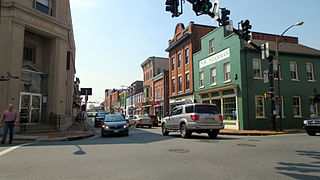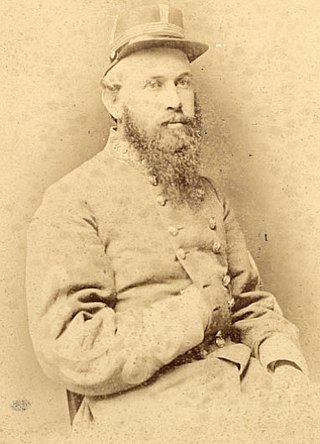Related Research Articles

The Battle of Fredericksburg was fought December 11–15, 1862, in and around Fredericksburg, Virginia, in the Eastern Theater of the American Civil War. The combat, between the Union Army of the Potomac commanded by Maj. Gen. Ambrose Burnside and the Confederate Army of Northern Virginia under Gen. Robert E. Lee, included futile frontal attacks by the Union army on December 13 against entrenched Confederate defenders along the Sunken Wall on the heights behind the city. It is remembered as one of the most one-sided battles of the war, with Union casualties more than twice as heavy as those suffered by the Confederates. A visitor to the battlefield described the battle as a "butchery" to U.S. President Abraham Lincoln.

Leesburg is a town in the state of Virginia, and the county seat of Loudoun County. Settlement in the area began around 1740, which is named for the Lee family, early leaders of the town and ancestors of Robert E. Lee. Located in the far northeast of the state, in the War of 1812 it was a refuge for important federal documents evacuated from Washington, DC, and in the Civil War, it changed hands several times.

Ambrose Powell Hill Jr. was a Confederate general who was killed in the American Civil War. He is usually referred to as A. P. Hill to differentiate him from another, unrelated Confederate general, Daniel Harvey Hill.

Stephen Dill Lee was an American officer in the Confederate Army, politician and first president of Mississippi State University from 1880 to 1899. He served as lieutenant general of the Confederate States Army in the Eastern and Western theaters of the American Civil War.

Gettysburg is a 1993 American epic war film about the Battle of Gettysburg in the American Civil War. Written and directed by Ronald F. Maxwell, the film was adapted from the 1974 historical novel The Killer Angels by Michael Shaara. It features an ensemble cast, including Tom Berenger as James Longstreet, Jeff Daniels as Joshua Chamberlain, Martin Sheen as Robert E. Lee, Stephen Lang as George Pickett, and Sam Elliott as John Buford.

The Battle of Ball's Bluff was an early battle of the American Civil War fought in Loudoun County, Virginia, on October 21, 1861, in which Union Army forces under Major General George B. McClellan suffered a humiliating defeat.

The Battle of Dranesville was a small battle during the American Civil War that took place between Confederate forces under Brigadier General J. E. B. Stuart and Union forces under Brigadier General Edward O. C. Ord on December 20, 1861, in Fairfax County, Virginia, as part of Major General George B. McClellan's operations in northern Virginia. The two forces on similar winter time patrols encountered and engaged one another in the crossroads village of Dranesville. The battle resulted in a Union victory.

The Battle of Chaffin's Farm and New Market Heights, also known as Laurel Hill and combats at Forts Harrison, Johnson, and Gilmer, was fought in Virginia on September 29–30, 1864, as part of the siege of Petersburg in the American Civil War.

James Henry Lane was a university professor and Confederate general in the American Civil War.

James Lawson Kemper was a lawyer, a Confederate general in the American Civil War, and the 37th Governor of Virginia. He was the youngest brigade commander and only non-professional military officer in the division that led Pickett's Charge, during which he was severely wounded.

William Barksdale was a lawyer, newspaper editor, US Representative, and Confederate general in the American Civil War. A staunch secessionist, he was mortally wounded during the Battle of Gettysburg while he led his brigade's attack on Union forces not far from Cemetery Ridge.

The Richmond National Battlefield Park commemorates 13 American Civil War sites around Richmond, Virginia, which served as the capital of the Confederate States of America for most of the war. The park connects certain features within the city with defensive fortifications and battle sites around it.

Thomas Taylor Munford was an American farmer, iron, steel and mining company executive and Confederate colonel and acting brigadier general during the American Civil War.
The Battle of Crampton's Gap, or Battle of Burkittsville, was a battle fought between forces under Confederate Brig. Gen. Howell Cobb and Union Maj. Gen. William B. Franklin as part of the Battle of South Mountain on September 14, 1862, at Crampton's Gap in Western Maryland, during the Maryland Campaign of the American Civil War.
The Battle of Mile Hill was a cavalry skirmish during the American Civil War, that took place just north of Leesburg, Virginia, on September 2, 1862. It preceded the occupation of the town by the Army of Northern Virginia just prior to its crossing of the Potomac River starting the Maryland Campaign.
Loudoun County, Virginia, was destined to be an area of significant military activity during the American Civil War. Located on Virginia's northern frontier, the Potomac River, Loudoun County became a borderland after Virginia's secession from the Union in early 1861. Loudoun County's numerous Potomac bridges, ferries and fords made it an ideal location for the Union and Confederate armies to cross into and out of Virginia. Likewise, the county's several gaps in the Blue Ridge Mountains that connected the Piedmont to the Shenandoah Valley and Winchester were of considerable strategic importance. The opposing armies would traverse the county several times throughout the war leading to several small battles, most notably the Battle of Balls Bluff.

Henry Thomas Harrison, often known simply as "Harrison", was a spy for Confederate Lieutenant General James Longstreet during the American Civil War. He is best known for the information he gave Longstreet and General Robert E. Lee in the Gettysburg Campaign, which resulted in Lee converging on Gettysburg, Pennsylvania, thus causing the Battle of Gettysburg in July 1863.
The Affair at Glenmore Farm was a small cavalry skirmish that took place October 16, 1862 in Loudoun County, Virginia between Confederate forces under First Lieutenant Frank Myers and Union forces under General John Geary during the American Civil War. The skirmish resulted in a Union victory.

Jubal Anderson Early was a Virginia lawyer and politician who became a Confederate general during the American Civil War. Trained at the United States Military Academy, Early resigned his U.S. Army commission after the Second Seminole War and his Virginia military commission after the Mexican–American War, in both cases to practice law and participate in politics. Accepting a Virginia and later Confederate military commission as the American Civil War began, Early fought in the Eastern Theater throughout the conflict. He commanded a division under Generals Stonewall Jackson and Richard Ewell, and later commanded a corps. A key Confederate defender of the Shenandoah Valley, during the Valley Campaigns of 1864, Early made daring raids to the outskirts of Washington, D.C., and as far as York, Pennsylvania, but was crushed by Union forces under General Philip Sheridan, losing over half his forces and leading to the destruction of much of the South's food supply. After the war, Early fled to Mexico, then Cuba and Canada, and upon returning to the United States took pride as an "unrepentant rebel." Particularly after the death of Gen. Robert E. Lee in 1870, Early delivered speeches establishing the Lost Cause position. Early helped found the Southern Historical Society and memorial associations.
The Civil War Trust's Civil War Discovery Trail is a heritage tourism program that links more than 600 U.S. Civil War sites in more than 30 states. The program is one of the White House Millennium Council's sixteen flagship National Millennium Trails. Sites on the trail include battlefields, museums, historic sites, forts and cemeteries.
References
- 1 2 The Town of Leesburg, "Exploring Leesburg", 2003
- ↑ Mac Carey, "James Dickey's Leesburg: The House of Deliverance", Literary Traveler, January 2011